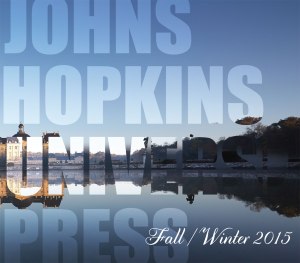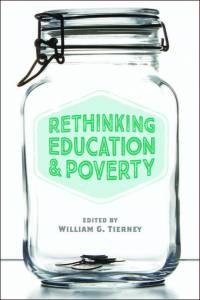 We’re excited about the books we’ll be publishing this fall—and pleased to share this series of “Fall Books Preview” blog posts! Be sure to check out the online edition of JHUP’s entire Fall 2015 catalog, and remember that promo code “HDPD” gets you a 30% discount on pre-pub orders. Today we continue with selections from our very strong list in education:
We’re excited about the books we’ll be publishing this fall—and pleased to share this series of “Fall Books Preview” blog posts! Be sure to check out the online edition of JHUP’s entire Fall 2015 catalog, and remember that promo code “HDPD” gets you a 30% discount on pre-pub orders. Today we continue with selections from our very strong list in education:
 The 160-Character Solution: How Text Messages and Other Behavioral Strategies Can Improve Education
The 160-Character Solution: How Text Messages and Other Behavioral Strategies Can Improve Education
Benjamin L. Castleman
In The 160-Character Solution, Benjamin L. Castleman shows how insights from behavioral economics—the study of how social, cognitive, and emotional factors affect our decisions—can be leveraged to help students complete assignments, perform to their full potential on tests, and choose schools and colleges where they are well positioned for success. By employing behavioral strategies or “nudges,” Castleman shows, administrators, teachers, and parents can dramatically improve educational outcomes from preschool to college.
“Castleman does a wonderful job explaining how behavioral science can be used in a concrete way to improve educational outcomes. No one has brought these ideas together in one book focused on education before.”—Josh Wright, ideas42
Available in November
 Palace of Ashes: China and the Decline of American Higher Education
Palace of Ashes: China and the Decline of American Higher Education
Mark S. Ferrara
In addition to possessing the world’s largest economies, China and the United States have extensive higher education systems comparable in size. By juxtaposing their long and distinctive educational traditions, Palace of Ashes offers compelling evidence that American colleges and universities are quickly falling behind in measures such as scholarly output and the granting of doctoral degrees in STEM fields. China, in contrast, has massed formidable economic power in support of its universities in an attempt to create the best educational system in the world.
“Interesting, provocative, and original. Ferrara adopts a progressive position to critique neoliberal trends while also defending the humanities and liberal learning more generally.”—Robert A. Rhoads, University of California–Los Angeles, coauthor of China’s Rising Research Universities: A New Era of Global Ambition
Available in November
 Undisciplining Knowledge: Interdisciplinarity in the Twentieth Century
Undisciplining Knowledge: Interdisciplinarity in the Twentieth Century
Harvey J. Graff
In Undisciplining Knowledge, acclaimed scholar Harvey J. Graff presents readers with the first comparative and critical history of interdisciplinary initiatives in the modern university. Arranged chronologically, the book tells the engaging story of how various academic fields both embraced and fought off efforts to share knowledge with other scholars. It is a story of myths, exaggerations, and misunderstandings, on all sides. Scholars across the disciplines, specialists in higher education, administrators, and interested readers will find the book’s multiple perspectives and practical advice on building and operating—and avoiding fallacies and errors—in interdisciplinary research and education invaluable.
“I am fascinated by Undisciplining Knowledge. The most comprehensive and complicating examination of interdisciplinary study yet undertaken, it will help readers think more creatively and in more divergent ways about intellectual inquiry and the ways to conduct it across disciplinary bodies of knowledge and frames of mind. Graff pushes on the boundaries of received wisdom.”—Mike Rose, University of California–Los Angeles, Department of Education, author of Why School? Reclaiming Education for All of Us
Available in September
 Rethinking Education and Poverty
Rethinking Education and Poverty
edited by William G. Tierney
In remarkably nuanced ways, this volume examines education’s role as both a possible factor in perpetuating—and a tool for alleviating—entrenched poverty. Education has long been seen as a way out of poverty. Some critics, however, argue that educational systems mask inequality and perpetuate cycles of poverty and wealth; others believe that the innate resilience or intellectual ability of impoverished students is what allows those individuals to succeed. Rethinking Education and Poverty grapples in turn with the ramifications of each possibility.
“This landmark book represents a highly original and substantial contribution to the literature on poverty and education. The diverse authors Tierney has collected are luminaries in the field, and their scholarship and theoretical insights are equal to their reputations.”—Kenneth M. Kempner, Southern Oregon University
Available in November
 MOOCs, High Technology, and Higher Learning
MOOCs, High Technology, and Higher Learning
Robert A. Rhoads
In MOOCs, High Technology, and Higher Learning, Robert A. Rhoads places the OpenCourseWare (OCW) movement into the larger context of a revolution in educational technology. In doing so, he seeks to bring greater balance to increasingly polarized discussions of massively open online courses (MOOCs) and show their ongoing relevance to reforming higher education and higher learning.
“A timely book that not only defines and describes MOOCs but also situates the MOOC phenomenon within a cultural context by discussing various intersecting cultures and forces that have contributed to their development. An important contribution.”—Claire Howell Major, University of Alabama, author of Teaching Online: A Guide to Theory, Research, and Practice
Available in November
 Changing the Face of Engineering: The African American Experience
Changing the Face of Engineering: The African American Experience
edited by John Brooks Slaughter, Yu Tao, and Willie Pearson, Jr.
In Changing the Face of Engineering, twenty-four eminent scholars address the underrepresentation of African Americans in engineering from a wide variety of disciplinary and professional perspectives while proposing workable classroom solutions and public policy initiatives. They combine robust statistical analyses with personal narratives of African American engineers and STEM instructors who, by taking evidenced-based approaches, have found success in graduating African American engineers.
“Changing the Face of Engineering is rigorous, employs and reports the best national data, and confronts an important problem from multiple perspectives. A landmark achievement.”—David E. Drew, Claremont Graduate University, author of STEM the Tide: Reforming Science, Technology, Engineering, and Math Education in America
Available in December

